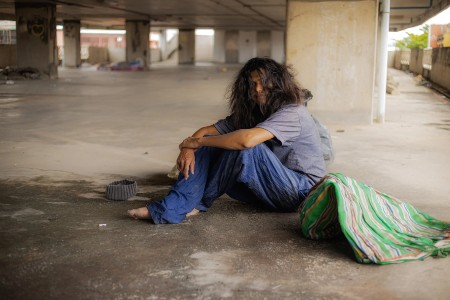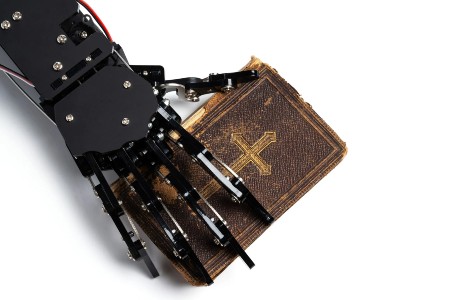Pope: End Violence in Sri Lanka
FREE Catholic Classes
'May Our Lady of Madhu, so venerated by Catholics and by members of other religions, hasten the day of peace and reconciliation in that dear country."
Highlights
Benedict XVI also ends his lessons on St Paul, remembering his martyrdom. Modern exegetic work on Paul's thought is leading to "convergence" between Catholic and Protestants on the very point that gave rise to the "great historical disagreement."
Vatican City (AsiaNews) - In his general audience today, the last dedicated to the figure and thought of St Paul, Apostle of the Gentiles, Benedict XVI appealed to the parties in Sri Lanka's conflict to respect humanitarian law and seek reconciliation. He also discussed the ecumenical journey marked by convergence between Catholics and Protestants over their "great historical disagreement".
In a "pressing appeal" on behalf of the Asian country, the Pope expressed his concern over the very disturbing situation in Sri Lanka.
"News of the worsening conflict and the growing number of innocent victims induces us to address a pressing appeal to the combatants to show respect for humanitarian law and for people's freedom of movement," he said. "May they do everything possible to guarantee assistance for the wounded and security for civilians, and enable their most urgent food and healthcare needs to be satisfied. May Our Lady of Madhu, so venerated by Catholics and by members of other religions, hasten the day of peace and reconciliation in that dear country."
In concluding his presentation on the thought and figure of St Paul, which he has been doing since before summer last year, Benedict XVI spoke about the end of the Apostle's "earthly life", which according to tradition, was a martyr's death in Rome.
"The New Testament does not mention the event. The Acts of the Apostles ends with the story of his imprisonment." But Paul himself did say however "I am already being poured out like a libation, and the time of my departure is at hand."
The first account of his death is dated 90 AD, about 30 years after his martyrdom, in a letter to the Church in Corinth Pope Clement I wrote that after "Peter [. . .] departed unto the place of glory due to him [. . .] Paul, too, showed by example the prize that is given to patience; seven times was he cast into chains [. . .] a herald" of Christ.
Clement also wrote that Paul reached the farthest bounds of the West, that is modern Spain, but there is no certain truth to that. Yet "it is interesting how the names of Peter and Paul come up one after the other. [. . .] Although he inverted the order, Eusebius wrote that Paul was beheaded and Peter crucified." For his part "Caius Presbyter wrote: 'And I can show the trophies of the apostles. For if you choose to go to the Vatican or to the Ostian Road, you will find the trophies of those who founded this church'."
Paul's martyrdom is first mentioned in the Acts of Paul (2nd century AD). "Nero condemned him to be beheaded whereupon the execution was summarily carried out. The date of death varies in the ancient sources, which place it somewhere between the persecution unleashed by Nero after the fire of Rome in the summer of 64, and the last year of his reign, in 68 AD."
"Later traditions add two elements. The most mythical tradition says he was martyred on the Laurentine Road." As his head bounced three times on the ground, water sprang at the three different spots, in a place that is still known today as the "Tre Fontane" (Three Fountains).
"The other tradition, by Caius, not only said that he was buried outside the city's walls, at the 2nd mile on the Ostian Road, but that his final resting place was on an estate belonging, according to tradition, to a Roman matron, Lucina, where Constantine built a church in the 4th century," later expanded, and which is today's Basilica of St Paul's Outside-the-Walls.
"In any case the figure of St. Paul towers over the events of his earthly life and death." As "a true disciple he became a sign of contradiction," a "suspected apostate" under Jewish Law. But the Acts of the Apostles already shows how much Christians venerated him.
"Everyone was nourished by the [Apostle's] letters," said the Pope, who cited the examples of St John Chrysostom, St Augustine and St Thomas.
Another decisive interpretation of Paul's ideas came with the Protestant Reformation, when Luther "found a new interpretation for the Pauline doctrine of justification which freed him from scruples and concern [. . .] and gave him a new and radical trust in the goodness of God, Who forgives everything unconditionally" and the "the Church herself appeared to him as enslaved to the Law, with which he contrasted the freedom of the Gospel."
In more recent times, a new scientific interpretation of the Holy Scriptures and Paul's thought developed in which "the concept of freedom' came to be considered "as a central part of the Apostle's thought."
Exegetic progress has in turn led to greater convergence between Catholics and Protestants, and to the discovery of more common ground with regards to their great historical disagreement, on the question of justification, which is central to ecumenism.
"Standing before us is the shining figure of an Apostle" who is "a fruitful and profound Christian thinker," said the Pope. Drawing on his doctrine and example will enable us to "consolidate our Christian identity and invigorate the entire Church."
Join the Movement
When you sign up below, you don't just join an email list - you're joining an entire movement for Free world class Catholic education.
-

-
Mysteries of the Rosary
-
St. Faustina Kowalska
-
Litany of the Blessed Virgin Mary
-
Saint of the Day for Wednesday, Oct 4th, 2023
-
Popular Saints
-
St. Francis of Assisi
-
Bible
-
Female / Women Saints
-
7 Morning Prayers you need to get your day started with God
-
Litany of the Blessed Virgin Mary
Bound by Betrayal: Katie's Struggle with Lust, Lies, and Redemption
-

John: A Story of Addiction, Hopelessness, and the Search for Redemption
-

Science vs. Faith: The Battle for Truth and Hope
-
Regenerative Agriculture: The Answer to America's Chemical-Laden Food Crisis
-
Prestige vs. Purpose: Where Should Your Donations Really Go?
Daily Catholic
 Daily Readings for Tuesday, January 07, 2025
Daily Readings for Tuesday, January 07, 2025 St. Raymond of Pennafort: Saint of the Day for Tuesday, January 07, 2025
St. Raymond of Pennafort: Saint of the Day for Tuesday, January 07, 2025 Prayer for a Blessing on the New Year: Prayer of the Day for Tuesday, December 31, 2024
Prayer for a Blessing on the New Year: Prayer of the Day for Tuesday, December 31, 2024- Daily Readings for Monday, January 06, 2025
- St. Andre Bessette: Saint of the Day for Monday, January 06, 2025
- St. Theresa of the Child Jesus: Prayer of the Day for Monday, December 30, 2024
![]()
Copyright 2024 Catholic Online. All materials contained on this site, whether written, audible or visual are the exclusive property of Catholic Online and are protected under U.S. and International copyright laws, © Copyright 2024 Catholic Online. Any unauthorized use, without prior written consent of Catholic Online is strictly forbidden and prohibited.
Catholic Online is a Project of Your Catholic Voice Foundation, a Not-for-Profit Corporation. Your Catholic Voice Foundation has been granted a recognition of tax exemption under Section 501(c)(3) of the Internal Revenue Code. Federal Tax Identification Number: 81-0596847. Your gift is tax-deductible as allowed by law.







 Daily Readings for Tuesday, January 07, 2025
Daily Readings for Tuesday, January 07, 2025 St. Raymond of Pennafort: Saint of the Day for Tuesday, January 07, 2025
St. Raymond of Pennafort: Saint of the Day for Tuesday, January 07, 2025 Prayer for a Blessing on the New Year: Prayer of the Day for Tuesday, December 31, 2024
Prayer for a Blessing on the New Year: Prayer of the Day for Tuesday, December 31, 2024


